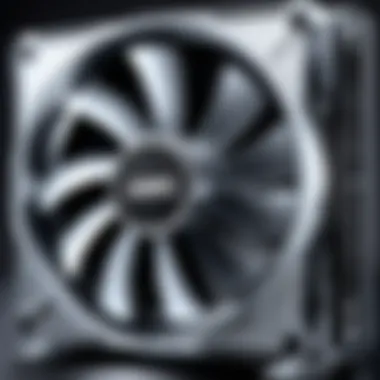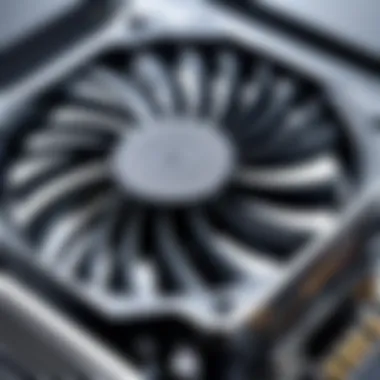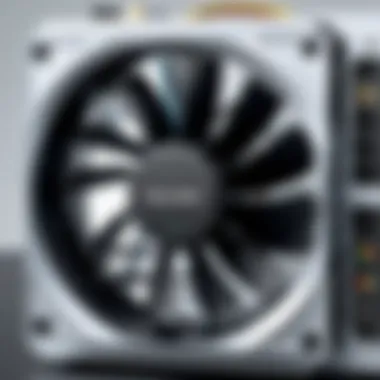Unveiling the Impact of External Computer Fans on System Performance Enhancement


Introduction
This article endeavors to dissect the critical role played by external computer fans in enhancing the performance and longevity of computer systems. It embarks on a thorough exploration, meticulously scrutinizing the functions, various types, benefits, and essential considerations entwined with the deployment of external fans to effectively manage temperature and stimulate optimal airflow within computers.
Understanding the Significance of External Computer Fans
In the realm of computer systems, the role of external fans in maintaining ideal temperatures and fostering efficient airflow is paramount. Such fans are designed to stave off overheating, which could potentially compromise the system's performance and durability. By grasping the fundamental significance of external computer fans, users can better appreciate their pivotal contribution to ensuring smooth operations and longevity.
Functions of External Computer Fans
External computer fans fulfill a myriad of crucial functions that are indispensable to the overall well-being of the system. From dissipating excess heat generated by internal components to facilitating the circulation of fresh air throughout the system, these fans play a multifaceted role in maintaining optimal operating conditions. Understanding the specific functions of external computer fans is integral to harnessing their full potential for system performance optimization.
Types of External Computer Fans
Diverse varieties of external computer fans exist in the market, each tailored to address specific cooling needs and system configurations. Ranging from traditional air-cooled fans to more advanced liquid cooling solutions, the multitude of options available can cater to varying user requirements and preferences. Exploring the different types of external computer fans enables users to make informed decisions regarding the most suitable cooling solutions for their systems.
Benefits of Utilizing External Computer Fans
The advantages of integrating external computer fans into one's system setup are plentiful and far-reaching. From enhanced cooling efficiency and increased system stability to prolonged hardware lifespan and optimized performance during intensive tasks, the benefits are compelling. By delving into the upsides of employing external fans, users can glean a clear understanding of how these components can positively impact their computing experiences.
Essential Considerations for External Computer Fans
Despite the benefits they offer, external computer fans necessitate careful consideration and thoughtful implementation to maximize their efficacy. Factors such as fan placement, airflow direction, noise levels, and maintenance requirements merit attention to ensure optimal performance and longevity. By adhering to essential considerations for external computer fans, users can refine their cooling strategies and safeguard their systems against potential risks.
Conclusion
Introduction
Computer systems rely heavily on efficient cooling systems to maintain optimal performance. In this article, we delve into the crucial role of external computer fans in enhancing system performance and longevity. By focusing on the functions, types, benefits, and considerations associated with utilizing external fans, we aim to provide a comprehensive guide to optimizing computer performance through effective temperature regulation.
Understanding the Importance of Cooling Systems in Computers
Impacts of Heat on Computer Performance
The heat generated within a computer system can have detrimental effects on its performance. High temperatures can lead to reduced efficiency, system slowdowns, and even hardware failures. Understanding the impacts of heat on computer performance is essential to grasp the urgency of effective cooling solutions. By addressing this issue, users can ensure the smooth operation and longevity of their computers.
Role of Fans in Heat Dissipation


Fans play a vital role in dissipating heat generated by computer components. By actively moving air through the system, fans help in regulating temperature levels and preventing overheating. The efficiency of fans in heat dissipation is critical for maintaining optimal performance and preventing damage to sensitive hardware components. Understanding the significance of fans in heat dissipation is key to implementing effective cooling strategies.
Overview of External Computer Fans
Purpose and Functionality
External computer fans serve the purpose of increasing airflow within the system to aid in heat dissipation. Their functionality lies in enhancing the overall cooling efficiency of computers, especially in systems with limited built-in cooling mechanisms. Choosing the right external fan can significantly improve thermal management and optimize system performance.
Types of External Fans Available
A variety of external fans are available in the market, each designed with specific features to cater to different cooling needs. From portable USB-powered fans to high-performance radiator fans, users have a wide range of options to choose from. Understanding the types of external fans available allows users to select the most suitable option for their unique cooling requirements.
Significance of Effective Cooling Solutions
Enhanced Performance
Effective cooling solutions lead to enhanced performance by ensuring that computer components operate within optimal temperature ranges. By maintaining lower temperatures, external fans contribute to improved system efficiency, faster processing speeds, and overall better performance. Investing in quality cooling solutions can significantly elevate the user experience and prolong the lifespan of computer systems.
Prevention of Overheating Issues
Overheating poses a significant risk to computer hardware, potentially causing permanent damage and system malfunctions. Effective cooling solutions, such as external fans, are instrumental in preventing overheating issues by regulating temperature levels and promoting steady airflow. By proactively addressing overheating concerns, users can safeguard their investments and enjoy uninterrupted computing experiences.
Benefits of Using External Computer Fans
External computer fans play a vital role in optimizing system performance and extending the lifespan of computer components. By efficiently regulating temperature levels, these fans ensure that the computer operates within the optimal temperature range, preventing overheating issues. Additionally, external fans facilitate efficient heat dissipation, reducing the risk of component degradation due to excessive heat exposure. Noise reduction is another key benefit, as modern external fans operate quietly, enhancing the user experience. The sleek and modern designs of these fans not only contribute to noise reduction but also add an aesthetic appeal to the computer setup. When selecting an external fan for your computer, factors such as compatibility, airflow capacity, and noise levels should be considered to maximize the benefits offered by these cooling solutions.
Improved Thermal Management
Regulation of Temperature Levels
Regulating temperature levels is essential for maintaining the overall health and performance of a computer system. External fans excel in this aspect by actively monitoring and adjusting the internal temperature of the computer to prevent overheating. This efficient regulation ensures that the components function optimally, thereby enhancing the overall longevity of the system. The unique feature of temperature regulation lies in its ability to automatically adjust fan speed based on the system's temperature, ensuring a constant and safe operating environment. While the advantages of temperature regulation are substantial in improving system performance, it is crucial to monitor and fine-tune these settings to avoid potential drawbacks.
Efficient Heat Dissipation
Efficient heat dissipation is key to preventing component damage and ensuring the longevity of computer hardware. External fans contribute significantly to this process by effectively expelling heat generated during system operations. By swiftly removing excess heat, these fans protect components from the adverse effects of prolonged exposure to high temperatures. The standout characteristic of efficient heat dissipation is its ability to maintain a stable and cool environment within the computer case, promoting system efficiency and reliability. While the advantages of heat dissipation are evident in enhancing system performance, it is essential to ensure proper ventilation and airflow for optimal cooling results.
Extended Lifespan of Computer Components


Reduced Wear and Tear
Reducing wear and tear on computer components is crucial for preventing premature failures and costly repairs. External fans mitigate this risk by actively cooling critical components, minimizing the strain caused by heat accumulation. This reduced wear and tear translate to prolonged component lifespan, ensuring sustained performance and reliability. The key characteristic of reduced wear and tear lies in its ability to maintain components at optimal operating temperatures, preserving their functionality over an extended period. While the benefits of reduced wear and tear are instrumental in prolonging component life, it is essential to ensure proper maintenance practices to maximize these advantages.
Prevention of Component Degradation
Preventing component degradation is essential for safeguarding the overall integrity of a computer system. External fans play a pivotal role in this aspect by preventing heat-related damage to sensitive components. By expelling heat efficiently, these fans safeguard components from the detrimental effects of overheating, ensuring sustained performance and reliability. The unique feature of component degradation prevention is its ability to maintain a stable and secure environment for critical hardware components. While the advantages of this preventive measure are evident in enhancing system longevity, it is essential to choose a fan with the appropriate cooling capacity for optimal protection.
Noise Reduction and Enhanced Aesthetics
Quiet Operation
Achieving quiet operation is a significant benefit of utilizing external computer fans, particularly in environments where noise levels are a concern. These fans operate silently, reducing disturbances during intensive computing tasks or gaming sessions. The key characteristic of quiet operation lies in the fan's design and efficient motor, which minimize operational noise without compromising cooling performance. The unique feature of quiet operation enhances the user experience by providing a peaceful computing environment while ensuring effective heat dissipation. While the advantages of quiet operation contribute to a more enjoyable user experience, it is important to consider airflow requirements and cooling efficiency when selecting a fan for noise reduction.
Sleek and Modern Designs
The sleek and modern designs of external computer fans not only serve an aesthetic purpose but also enhance airflow and cooling efficiency. These fans are designed to complement modern computer setups, adding a touch of style to the overall aesthetics. The key characteristic of sleek and modern designs is their ability to combine functionality with visual appeal, creating a balance between form and function. The unique feature of these designs lies in their ability to improve airflow within the computer case while maintaining a modern and minimalist look. While the advantages of sleek and modern designs contribute to a visually appealing setup, it is important to prioritize cooling performance and airflow considerations when selecting a fan for aesthetic purposes.
Choosing the Right External Fan for Your Computer
When considering the optimal performance of your computer system, the selection of the appropriate external fan plays a pivotal role in maintaining efficiency and preventing overheating issues. The choice of an external fan is crucial as it directly impacts the airflow, cooling capacity, and noise levels of your computer. By focusing on the specific elements of compatibility with your computer, airflow and cooling capacity, and noise levels, you can ensure a seamless integration and operation within your setup.
Factors to Consider
Compatibility with Computer
In the realm of external fans for computers, compatibility with your specific computer model is paramount in ensuring a snug fit and optimal performance. When the external fan is compatible with your system, it enhances the overall cooling efficiency and promotes better airflow circulation. The unique feature of compatibility lies in its ability to provide tailor-made solutions, ensuring that the fan seamlessly integrates with your computer setup. However, drawbacks may arise if compatibility is overlooked, leading to ineffective cooling and potential damage to your components.
Airflow and Cooling Capacity
The airflow and cooling capacity of an external fan are essential considerations when choosing the right cooling solution for your computer. Effective airflow ensures that hot air is expelled efficiently, preventing heat buildup and maintaining optimal temperatures inside the system. A high cooling capacity facilitates the dissipation of heat generated during intensive tasks, safeguarding your computer components from thermal damage. Despite these advantages, the noise level of fans may increase with higher cooling capacities, affecting the overall acoustics of your system.
Noise Levels
Another critical aspect to evaluate when selecting an external fan is the noise level generated during operation. Lower noise levels contribute to a quieter environment, especially crucial for individuals seeking a peaceful computing experience. Choosing fans with noise-reducing features can enhance the overall comfort while working or gaming on your computer. Nonetheless, some fans may sacrifice cooling performance to minimize noise levels, potentially impacting the overall cooling efficiency of your system.
Popular Brands and Models


Comparison of Top External Fans
When exploring the realm of external computer fans, comparing the top brands and models can aid in making an informed decision. Evaluating factors such as performance, durability, and pricing allows you to identify the fan that best aligns with your requirements. Highlighting specific characteristics of each fan model, along with user reviews and testing results, offers a comprehensive overview of their strengths and weaknesses. By understanding the nuances of each top external fan, you can make a well-informed choice that suits your specific needs.
Reviews and Recommendations
Delving deeper into reviews and recommendations from tech experts and users provides valuable insights into the practicality and efficiency of external fans. Real-life experiences shared through reviews offer experiential knowledge, guiding potential users in selecting the most suitable external fan for their computers. Recommendations based on performance, noise levels, and build quality assist in narrowing down the options and ensuring a satisfactory purchase. It is essential to gather diverse perspectives on different fan models to gain a holistic understanding before making a final decision.
Installation and Maintenance Tips
When delving into the role of external computer fans in enhanced performance, a critical aspect to consider is the proper Installation and Maintenance of these fans. Ensuring the correct installation and regular maintenance of external fans is paramount to optimize computer cooling and performance. By focusing on Installation and Maintenance Tips, users can prolong the lifespan of their systems and prevent overheating issues effectively.
Proper Installation Procedures
Placement Strategies:
Proper Placement Strategies play a vital role in the efficient operation of external computer fans. Deciding where to place the fan within the computer chassis is crucial for maximizing airflow and heat dissipation. Optimal Placement Strategies involve positioning the fan near hot components like the CPU or GPU to direct airflow effectively. This strategic placement ensures that the fan can cool the components efficiently, enhancing overall system performance and longevity.
Securing the Fan Correctly:
Securing the external fan correctly is essential to prevent vibrations, noise, and potential damage to the system. Properly securing the fan ensures stable operation and prevents unnecessary movement that could impact cooling efficiency. By securely fastening the fan to the designated mounting points in the chassis, users can maintain consistent airflow and cooling performance. However,it is vital to avoid over-tightening, as this could lead to noise issues or strain on the fan motor. Ensuring the fan is correctly attached guarantees optimal cooling without any operational disruptions.
Effective Maintenance Practices
Cleaning and Dust Removal:
Regular cleaning and dust removal are integral parts of maintaining external computer fans. Accumulated dust and debris can impede airflow and hinder the fan's ability to dissipate heat effectively. By regularly cleaning the fan blades and surrounding areas, users can prevent overheating and maintain peak performance. This practice not only enhances cooling efficiency but also extends the fan's lifespan, minimizing wear and tear on components.
Monitoring Fan Performance:
Monitoring the performance of external fans is key to identifying potential issues and ensuring optimal operation. By keeping an eye on fan speeds, noise levels, and airflow, users can detect any abnormalities early on. A sudden increase in noise or a decrease in airflow could indicate a problem that needs attention. Regularly monitoring fan performance allows users to address issues promptly, whether it involves cleaning the fan or adjusting airflow settings. This proactive approach helps maintain the fan's effectiveness in cooling the system and prevents any performance degradation over time.
Conclusion
In delving deep into the realm of external computer fans and their role in enhanced performance, it becomes apparent that these devices are integral to the optimization of computer systems. The critical aspects discussed in this segment underscore the importance of efficient cooling solutions in preventing overheating issues while also significantly enhancing overall performance levels. By considering the various factors associated with external fan selection, users can ensure compatibility, adequate airflow, and minimal noise levels, thereby maximizing the effectiveness of these cooling mechanisms.
Optimizing Computer Performance with External Fans
Summary of Benefits
Exploring the multifaceted benefits of utilizing external computer fans, it is evident that their role in thermal management is paramount. These fans excel at regulating temperature levels, ensuring efficient heat dissipation, and ultimately contributing to an extended lifespan of computer components. The key characteristic of these benefits lies in their ability to reduce wear and tear on hardware components, preventing degradation over time. Despite some limitations in noise reduction, the advantages of improved thermal management far outweigh any minor drawbacks, making external fans a crucial choice for bolstering system performance and longevity.
Final Recommendations
When it comes to final recommendations regarding the use of external computer fans, one cannot overlook their significant contribution to overall system optimization. Their quiet operation and sleek designs not only reduce noise levels but also enhance the aesthetics of computer setups. The unique feature of external fans lies in their ability to maintain optimal operating temperatures while improving the overall lifespan of computer hardware. While there may be some trade-offs in terms of noise levels, the advantages of utilizing these fans far surpass any potential drawbacks, making them a prudent choice for anyone seeking to maximize the performance and longevity of their computing systems.



